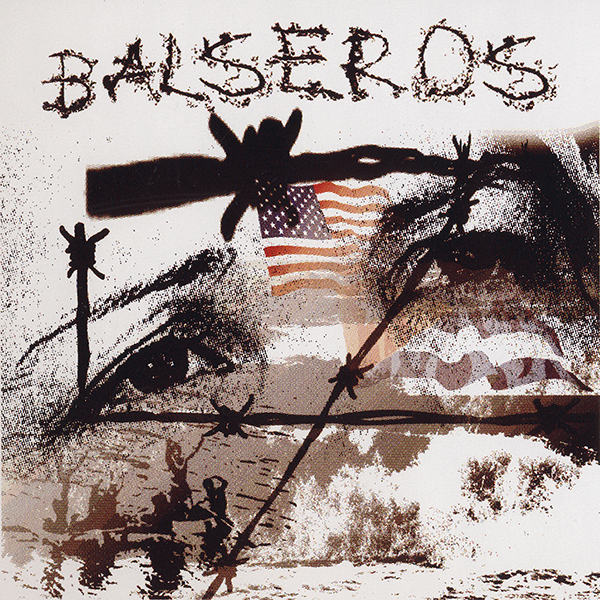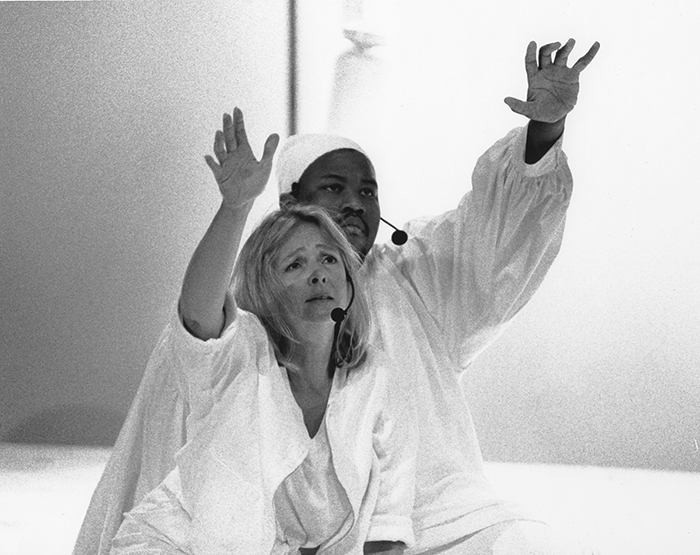
Directed by Michael Montel
Designed by Jorge Alberto Fernandez Suarez
An opera by Robert Ashley
with a libretto by Maria Irene Fornes
Commissioned by the
Florida Grand Opera, Miami Dade Community College – Wolfson Campus, and the
South Florida Composers Alliance.
Made possible by a grant from Lila Wallace-Reader’s Digest "Opera
for a New America" Program.
Presented by the Florida Grand Opera at the Colony Theater, Miami, May 1997.

Directed by Michael Montel
Designed by Jorge Alberto Fernandez Suarez
Voices:
Sam Ashley
Thomas Buckner
Jacqueline Humbert
Joan La Barbara
Demetra Adams
Emmanuel Cadet
Christina Clark
David Dillard
Amy Van Roekel
Nattacha Amador
Mario Salas-Lanz
Percussion:
Oscar Salas
Daniel Diaz
Tom Hamilton designed the processing of the instruments in the synthesizer orchestra and the processing of the live voices. The orchestral instruments were, in most cases, chosen by Robert Ashley. So, the sound of the orchestra and voices is an example of a profound collaboration. This collaboration has been working since the recording and performance of the four operas of Now Eleanor’s Idea, beginning in 1990.
The Cuban drum parts were composed by Daniel Diaz and Oscar Salas.
The libretto is based on interviews with:
Mr. Jorge del Rio Leon
Mr. Rafael Rodas
Ms. Yohanka Rodriquez Carvajal
Mr. Braulio Quevedo
Mr. Agustin Garcia
Mr. Francisco Escobar
Ms. Nancy Lledes Espinosa
Mr. Federico Falcon Gonzalez
Mr. David Cartaya
Mr. Ernesto Wong Castillo
Mr. Damaso Perez Busquet
Ms. Evelyn Crusata
Mr. Jos? Abreu
Mr. Reinaldo Alfonso Saiz
Mr. Ariel Ruiz
Dr. Angel Cancelo
Ms. Suzette Cancelo
Mr. Lazaro Diaz Fonsecas
Ms. Nadia Diaz Brito
Mr. Ernesto Gonzales Rojas
Mr. Frank Enrique Polo
Mr. Guillermo Delgado
Ms. Ibis Amig?
Ms. Dulce Trejo Garcia
Mr. Jos? Fernandez
|
|
The subject of the opera is the story of the rafters, or balseros (from the Spanish, balsa meaning raft), who have left Cuba on homemade rafts, seeking sanctuary in the United States. For the balseros, the objective is to get beyond the twelve-mile offshore limit into international waters with the hope of being rescued then by the U.S. Coast Guard. Just over half of those who leave are heard from again. The ninety-mile “channel” between Cuba and South Florida has extraordinary difficulties of currents and weather. It is shark-infested. And even a successful journey to the twelve-mile limit still leaves the rafters simply in open sea.

Apparently, in defiance of the laws of maritime rescue, many of the rafters' stories include incidents of being bypassed by all ships except the Coast Guard rescue vessels. Every so often, the Cuban government "allows" this bizarre form of exodus. Mostly the rafts have to be constructed in secrecy. With the poverty that has followed upon the collapse of the Soviet Union as a patron, there are no materials from which to construct the rafts, except through connections that are illegal and impossibly expensive. So, in every case, the rafts are unbelievable as seagoing vessels; and the decision to make the journey is a decision about life or death and a decision that will involve every member of a person?s family circle. The opera is not about the politics of this moment: the United States versus Cuba. It is a restatement of the oldest idea of America: escape from an oppressive situation to the "promised land." It is the story of courage against all odds, of intelligence and ingenuity in the face of impossible challenges, of reckless determination. The characters of the opera are the people who survived and have told us their stories. Maria Irene Fornes, the librettist, and I talked at length to twenty-five balseros. We discovered that in many of their stories the elements were the same and could be understood as parts of a common sequence?almost as "acts" of the opera:
I. The Raft. Its construction and the need to understand the requirements of the journey including provisions, navigation, seaworthiness ? and the unforeseeable.
II. The Departure. The moment of the decision to embark from the nearest beach. In many of the stories, this is the moment of highest drama.
III. The Sea. Its unimaginable vastness, dangers and psychological challenges.
IV. The Rescue.The arrival of a rescue boat, the physical struggle of boarding after days or weeks of thirst and starvation, the remembered obligations to those left behind, the grinding bureaucracy of the rescue as a political act, and the new hope.
Each "act" of the opera (whether the acts are separable and consecutive, or whether they recur and interfold as themes) will consist of scenes from the various stories we were told by the balseros themselves. The amazing consistency of these stories make one pause as if in the presence of a living myth. This is the way most of our ancestors came to America. The politics of the current situation dissolves in the presence of these individual stories of bravery and suffering and success.
For more information:
Performing Artservices, Inc.
Mimi Johnson
260 West Broadway
New York, NY 10013
tel: 212/941-8911
fax: 212/334-5149
artservicesinc@mindspring.com